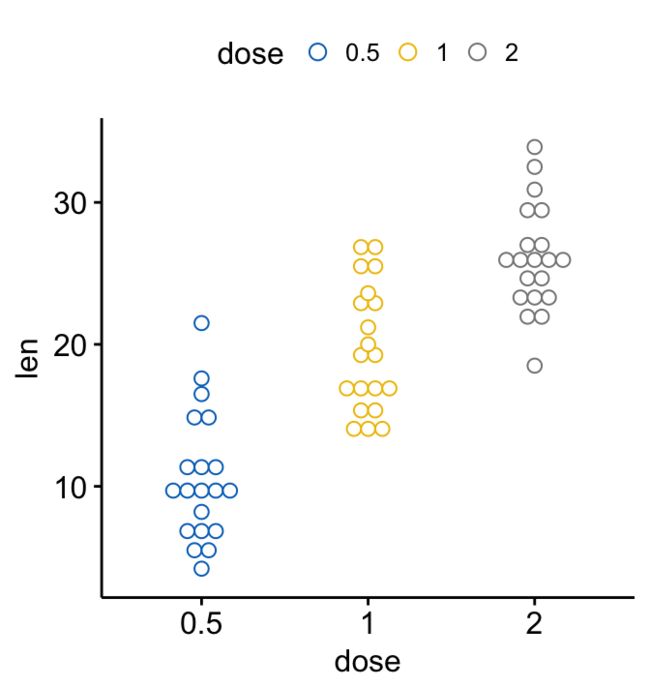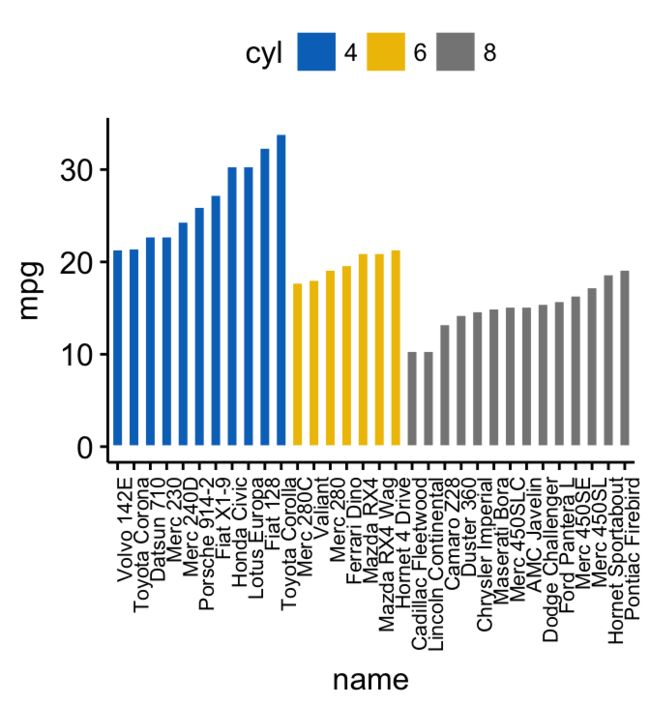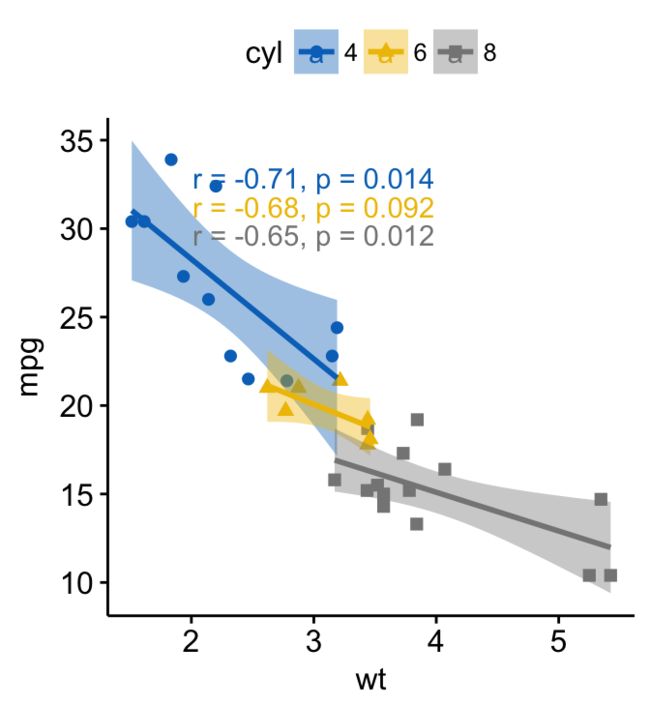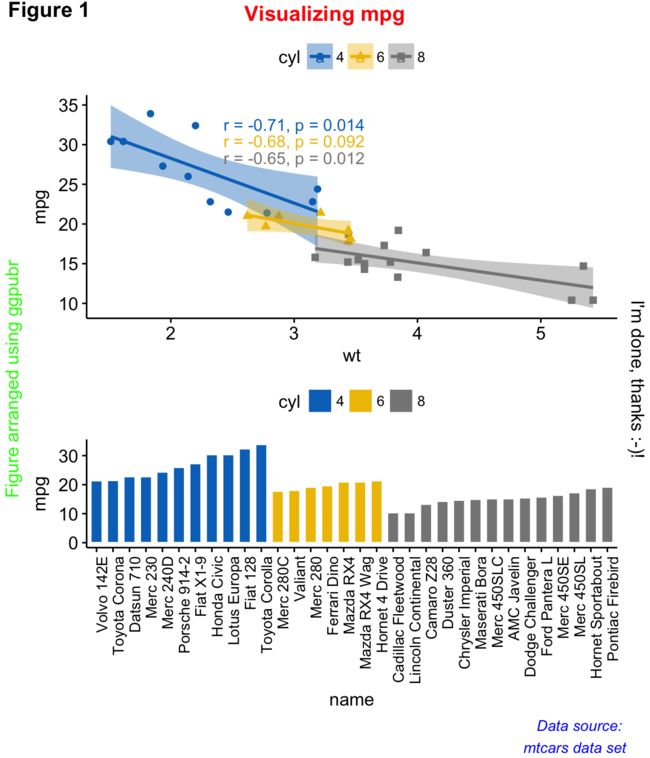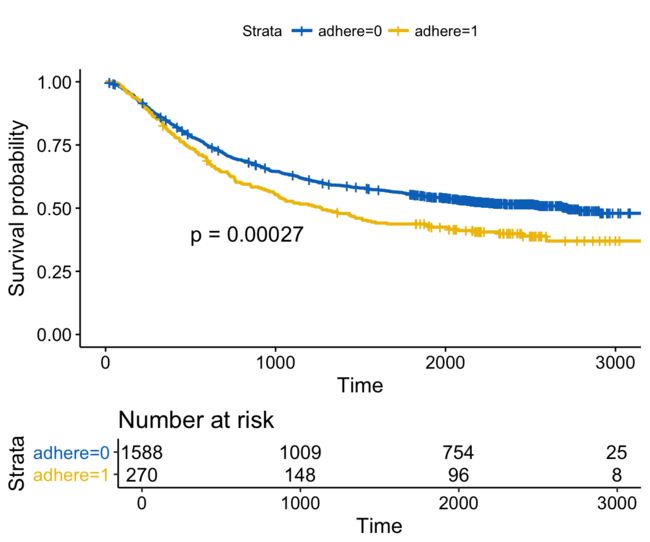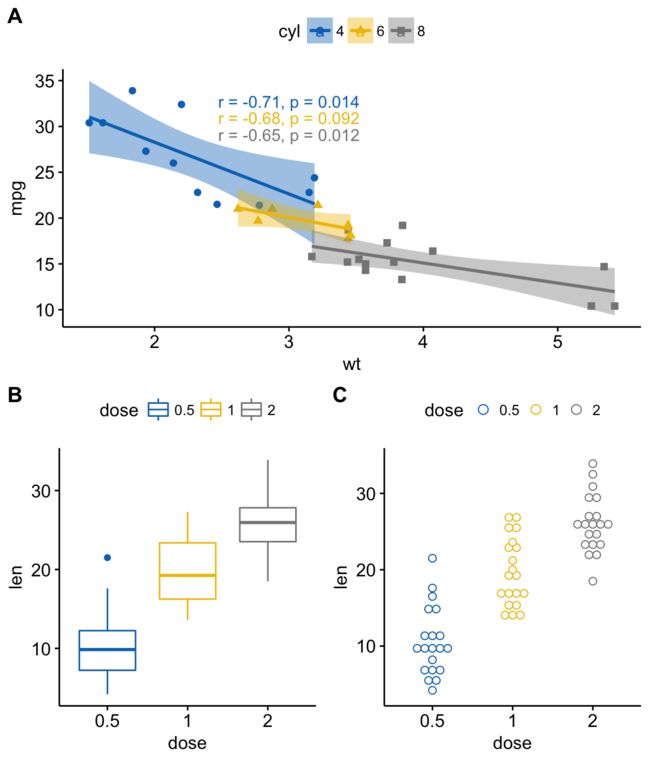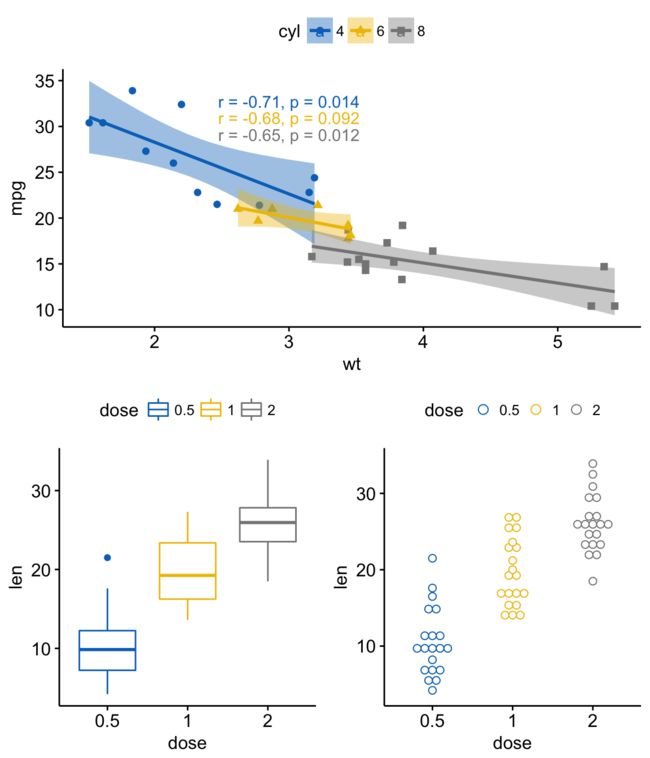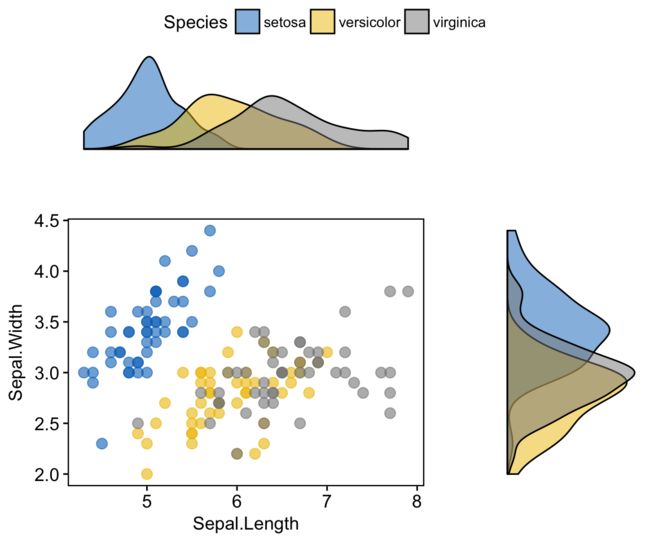r中gglot怎么组合多张图_怎样组合多张ggplot2图片
![]()
在同一页面上安排多张ggplot2图片时,普通的标准R函数par()和layout已经不能使用。
目前基本的解决办法是使用名叫ggExtra的R包,它包含以下功能:grid.arrange()和arrangeGrob()可以在一个页面上排列多个ggplots
marrangeGrob()可用于在多个页面上排列多个ggplots
但是,这些功能不会尝试对齐绘图面板; 相反,这些图只是简单地放置在网格中,因此轴不对齐。
因此我们可以使用ggpubr包提供的ggarrange()函数来实现多个ggplot图画的排布,并且提供统一的共同图例。
创建图片
使用演示数据集 ToothGrowth 和 mtcars创建多个图形:1
2
3
4
5
6
7
8bxp
color = "dose", palette = "jco")
bxp
# Dot plot (dp)
dp
color = "dose", palette = "jco", binwidth = 1)
2
3
4
5
6
7
8
9
10
11
12
13
14
15
16
17
18
19# Bar plot (bp)
bp
fill = "cyl", # change fill color by cyl
color = "white", # Set bar border colors to white
palette = "jco", # jco journal color palett. see ?ggpar
sort.val = "asc", # Sort the value in ascending order
sort.by.groups = TRUE, # Sort inside each group
x.text.angle = 90 # Rotate vertically x axis texts
)
bp + font("x.text", size = 8)
# Scatter plots (sp)
sp
add = "reg.line", # Add regression line
conf.int = TRUE, # Add confidence interval
color = "cyl", palette = "jco", # Color by groups "cyl"
shape = "cyl" # Change point shape by groups "cyl"
)+
stat_cor(aes(color = cyl), label.x = 3) # Add correlation coefficient
组合多张图片在一个面板上
使用ggpubr包的ggarrange()进行以下操作:1
2
3ggarrange(bxp, dp, bp + rremove("x.text"),
labels = c("A", "B", "C"),
ncol = 2, nrow = 2)
给图片添加注释
在这里, ggpubr包提供了函数annotate_figure()可以对面板中图片整体或任意图片添加一定量的注释
展示效果如下图:1
2
3
4
5
6
7
8
9
10figure
ncol = 1, nrow = 2)
annotate_figure(figure,
top = text_grob("Visualizing mpg", color = "red", face = "bold", size = 14),
bottom = text_grob("Data source: n mtcars data set", color = "blue",
hjust = 1, x = 1, face = "italic", size = 10),
left = text_grob("Figure arranged using ggpubr", color = "green", rot = 90),
right = "I'm done, thanks :-)!",
fig.lab = "Figure 1", fig.lab.face = "bold"
图片对齐
最经典的例子就是在绘制生存曲线时,把risk table放在生存曲线图的下边
此时,我们需要调节表和图的大小和相对位置,使其分布更为合理1
2
3
4
5
6
7
8
9
10
11
12# Fit survival curves
library(survival)
fit
# Plot survival curves
library(survminer)
ggsurv
palette = "jco", # jco palette
pval = TRUE, pval.coord = c(500, 0.4), # Add p-value
risk.table = TRUE # Add risk table
)
ggarrange(ggsurv$plot, ggsurv$table, heights = c(2, 0.7),
此时,我们可以看出图和表并不是完全垂直对齐的,要对齐他们需要调用align参数1
2ggarrange(ggsurv$plot, ggsurv$table, heights = c(2, 0.7),
ncol = 1, nrow = 2, align = "v")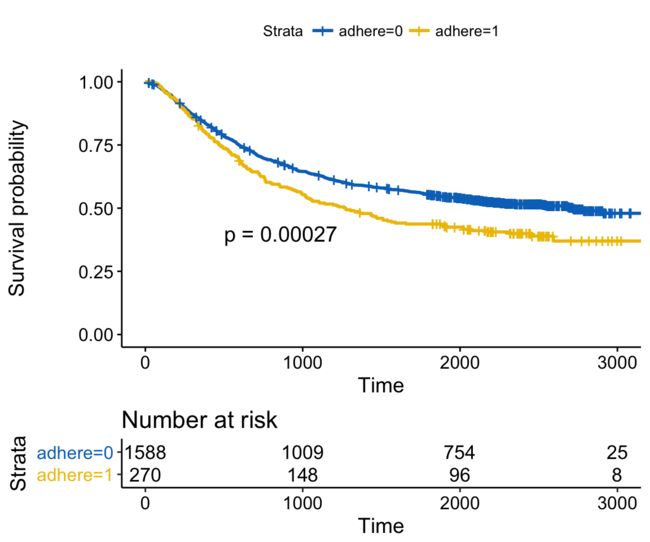
改变图形的行列布局排布
1. 使用ggpubr包
我们将使用嵌套的ggarrange()函数来更改图的列/行跨度。
例如,我们使用下边的代码可以实现这样的布局散点图(sp)将位于第一行并跨越两列
箱形图(bxp)和点图(dp)将首先排列,并且将在第二行中生活两列不同的列1
2
3
4
5ggarrange(sp, # First row with scatter plot
ggarrange(bxp, dp, ncol = 2, labels = c("B", "C")), # Second row with box and dot plots
nrow = 2,
labels = "A" # Labels of the scatter plot
2. 使用cowplot包
函数ggdraw()+ draw_plot()+ draw_plot_label()的组合可用于将图形放置在特定大小的特定位置。
ggdraw()可以初始化一个空的绘图画布,默认情况是这样的: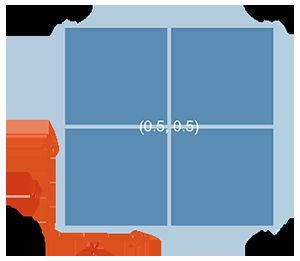
draw_plot()可以将绘图放置在绘图画布上的某处:1draw_plot(plot, x = 0, y = 0, width = 1, height = 1)
draw_plot_label() 可以向图的左上角添加绘图标签。它可以处理带有关联坐标的标签向量。1draw_plot_label(label, x = 0, y = 1, size = 16, ...)
如果需要组合多张图形,可以通过类似于下边的代码来实现:1
2
3
4
5
6
7library("cowplot")
ggdraw() +
draw_plot(bxp, x = 0, y = .5, width = .5, height = .5) +
draw_plot(dp, x = .5, y = .5, width = .5, height = .5) +
draw_plot(bp, x = 0, y = 0, width = 1, height = 0.5) +
draw_plot_label(label = c("A", "B", "C"), size = 15,
x = c(0, 0.5, 0), y = c(1, 1, 0.5))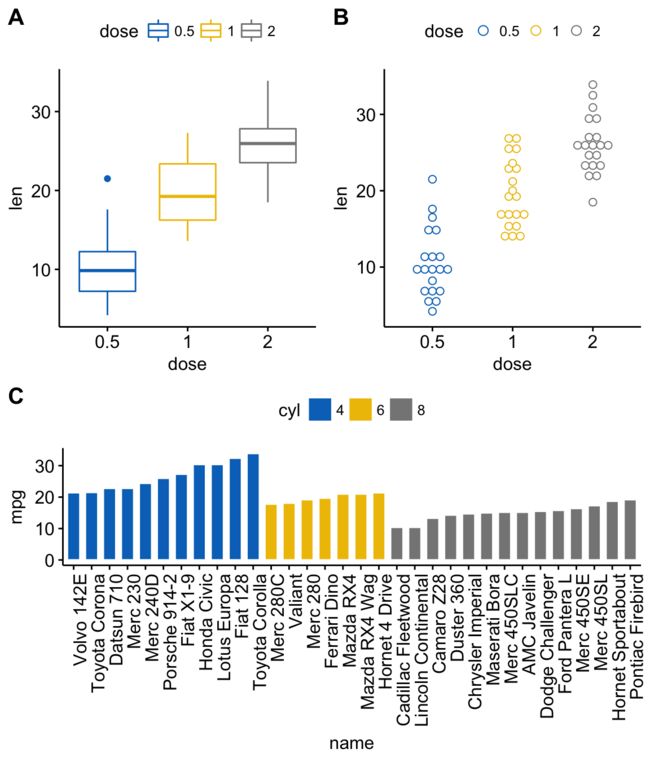
3. 使用gridExtra包
gridExtra包的使用方法和ggpubr包类似1
2
3
4library("gridExtra")
grid.arrange(sp, # First row with one plot spaning over 2 columns
arrangeGrob(bxp, dp, ncol = 2), # Second row with 2 plots in 2 different columns
我们同样可以使用gird.arrange()函数中的lay_matrix参数来设置,使用方法如下:1
2
3
4grid.arrange(bp, # bar plot spaning two columns
bxp, sp, # box plot and scatter plot
ncol = 2, nrow = 2,
layout_matrix = rbind(c(1,1), c(2,3)))在上面的R代码中,layout_matrix是一个2×2矩阵(2列和2行)。 第一行全是1,这是第一幅图占的地方,横跨两列; 第二行包含分别占据一列的图2和图3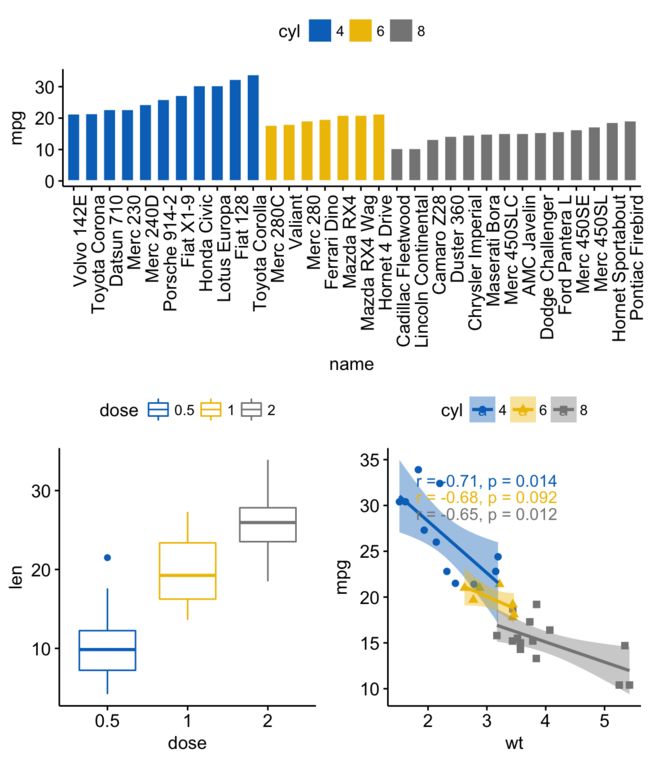
此时,如果需要对图形进行注释,ggpubr包已经不足以实现,需要我们使用cowplot包来进行进一步的注释
需要注意的是grid.arrange()/ arrangeGrob()输出的是一个gtable,首先需要使用ggpubr包中的as_ggplot()函数将其转换为ggplot。 接下来,就可以使用函数draw_plot_label()对其进行注释。1
2
3
4
5
6
7
8
9
10
11
12
13library("gridExtra")
library("cowplot")
# Arrange plots using arrangeGrob
# returns a gtable (gt)
gt
bxp, sp, # box plot and scatter plot
ncol = 2, nrow = 2,
layout_matrix = rbind(c(1,1), c(2,3)))
# Add labels to the arranged plots
p
draw_plot_label(label = c("A", "B", "C"), size = 15,
x = c(0, 0, 0.5), y = c(1, 0.5, 0.5)) # Add labels
p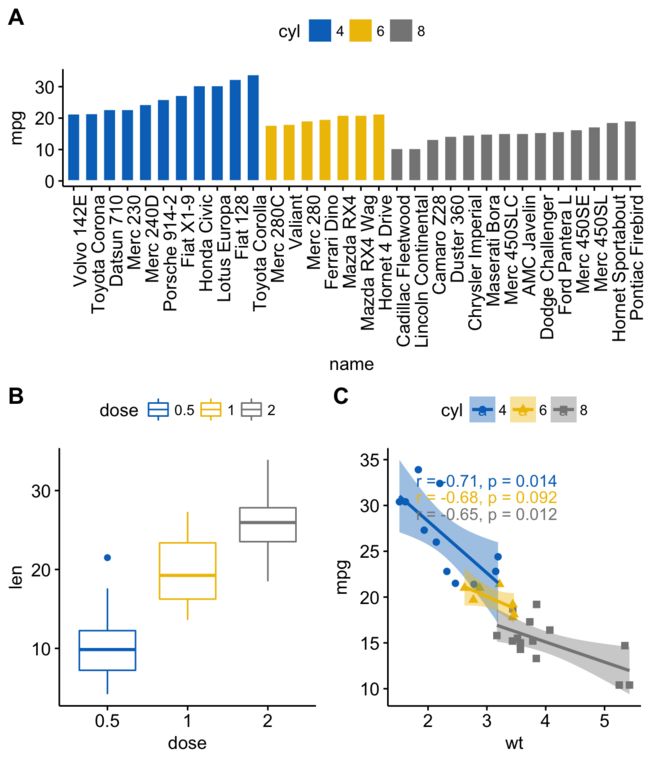 在上面的R代码中,我们使用了arrangeGrob()而不是grid.arrange()。请注意,这两个函数的主要区别在于,grid.arrange()会自动绘制排列好的图。由于我们要在绘制之前注释已排列的图,因此在这种情况下,函数arrangeGrob()是首选。
在上面的R代码中,我们使用了arrangeGrob()而不是grid.arrange()。请注意,这两个函数的主要区别在于,grid.arrange()会自动绘制排列好的图。由于我们要在绘制之前注释已排列的图,因此在这种情况下,函数arrangeGrob()是首选。
4. 使用grid包
通过函数grid.layout(),可以使用gridR包创建复杂的图像布局。 它还提供了函数viewport()来定义布局上图像的区域或位置。 函数print()用于将图放置在指定区域中。
总结起来共以下5个顺序步骤:
1. 创建绘图:p1,p2,p3,…
2. 使用函数grid.newpage()创建画板
3. 创建画板布局2X2 - 列数= 2; 行数= 2
4. 定义图像输出位置:画板中图像显示的区域
5. 在画板中输出显示图片1
2
3
4
5
6
7
8
9
10
11
12
13
14library(grid)
# Move to a new page
grid.newpage()
# Create layout : nrow = 3, ncol = 2
pushViewport(viewport(layout = grid.layout(nrow = 3, ncol = 2)))
# A helper function to define a region on the layout
define_region
viewport(layout.pos.row = row, layout.pos.col = col)
}
# Arrange the plots
print(sp, vp = define_region(row = 1, col = 1:2)) # Span over two columns
print(bxp, vp = define_region(row = 2, col = 1))
print(dp, vp = define_region(row = 2, col = 2))
print(bp + rremove("x.text"), vp = define_region(row = 3, col = 1:2))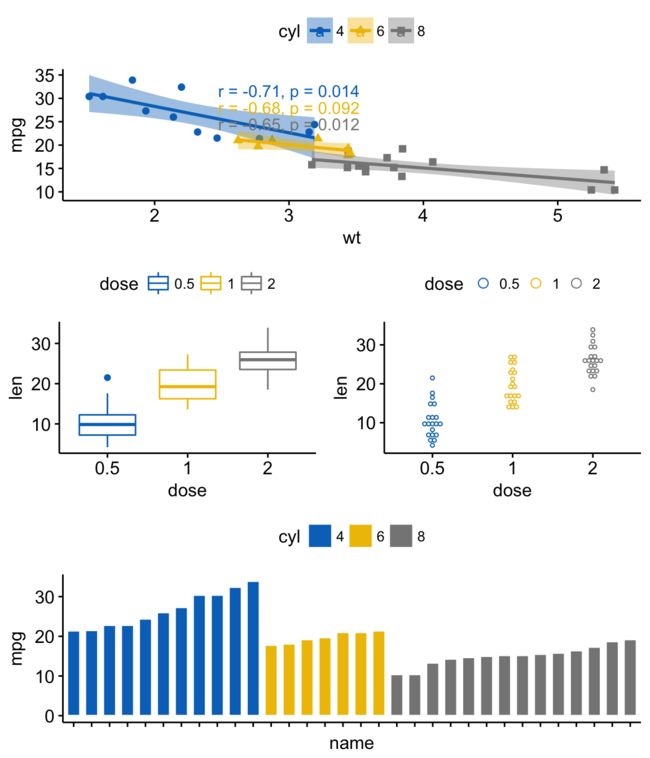
通用图例的设定
在我们绘制的图片当中,有的可能具有相同的图例,函数ggarrange()可以与以下参数一起使用,使两幅图使用相同的图例common.legend = TRUE:使用公共图例
legend:指定图例位置。 允许的值包括c(“top”,“bottom”,“left”,“right”)1
2ggarrange(bxp, dp, labels = c("A", "B"),
common.legend = TRUE, legend = "bottom")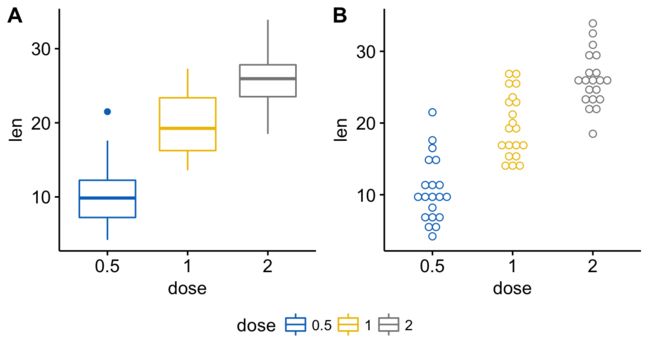
实战
给散点图添加边界密度图1
2
3
4
5
6
7
8
9
10
11
12
13
14
15
16
17
18
19# Scatter plot colored by groups ("Species")
sp
color = "Species", palette = "jco",
size = 3, alpha = 0.6)+
border()
# Marginal density plot of x (top panel) and y (right panel)
xplot
palette = "jco")
yplot
palette = "jco")+
rotate()
# Cleaning the plots
yplot
xplot
# Arranging the plot
ggarrange(xplot, NULL, sp, yplot,
ncol = 2, nrow = 2, align = "hv",
widths = c(2, 1), heights = c(1, 2),

